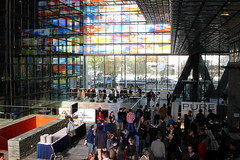For De Nieuwe Reporter I have written a day impression of the World Audio Festival 2006 (Dutch). It took place at the new Institute for Image and Sound (Dutch: Beeld en Geluid) in Hilversum, the Netherlands on the 9th of November.
It was an interesting day at an interesting location. But please let me add a thing I have not mentioned in the article: almost none of that really impressive archive which is stored at the Institute for Image and Sound is available on the Internet, mainly because of copyright restrictions. The Dutch ‘Publieke Omroep’ (Public Broadcast) has invested all their money into productions which are totally locked up in copyright. I hope that they now understand that they’ll need to invest more in open content productions, Creative Commons for example, so they can share those productions online as well as on radio and television. Or they can choose the YouTube path: just do it and ignore the copyright threads. Give the customers what they want: the Dutch archives of radio and tv online. And let’s face it: they have paid for it since the Publieke Omroep is non-commercial, but paid by tax-money of all Dutch citizens. Strange right? Yes, totally WTF!!!
Update: It seems that I was not 100% correct, because they are working on archive all material for the web. Strange thing though: not for free in most cases, but anyway: read this document!


3 Comments
I think the Creative Commons BY-SA License or maybe BY-SA-NC would be appropriate for non-commercial broadcasting.
The main point is: it’s an investment for the future. All old productions have only broadcast-rights for like 2 or 3 viewings on television. That’s totally unbelievable these days, but still: nothing has changed (yet). Production companies are still working for large sums of money and restricting everything with the same old copyright we’ve had for years. Acting like the internet doesn’t exists at all…
You’d think that people would begin to understand that if one is going to fund something with public money, then some public license is appropriate. Yet some folks are still mired in old-fashioned thinking.
It’s not that I mind copyright–it’s fine for the state to create this protection for artists. But it’s more than fine–certainly desirable–for the state (or people in the private market) to demand some compromises in return for funding things like this.
It would be cool, though, if all such festivals were Creative Commons/GNU/open source in orientation. Imagine how much great music
could be placed for easy access by the public. The artists could benefit directly from the funding, and the improvements in audio technology means that no longer would such a venture necessarily be lesser in sound quality.
comment5 rickey smiley